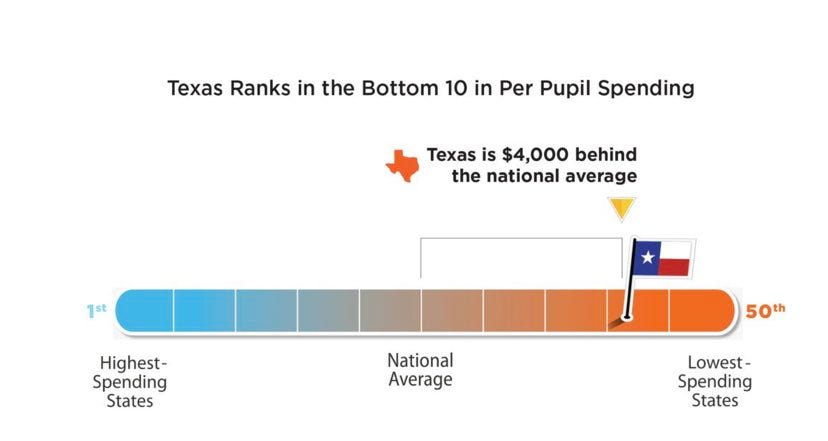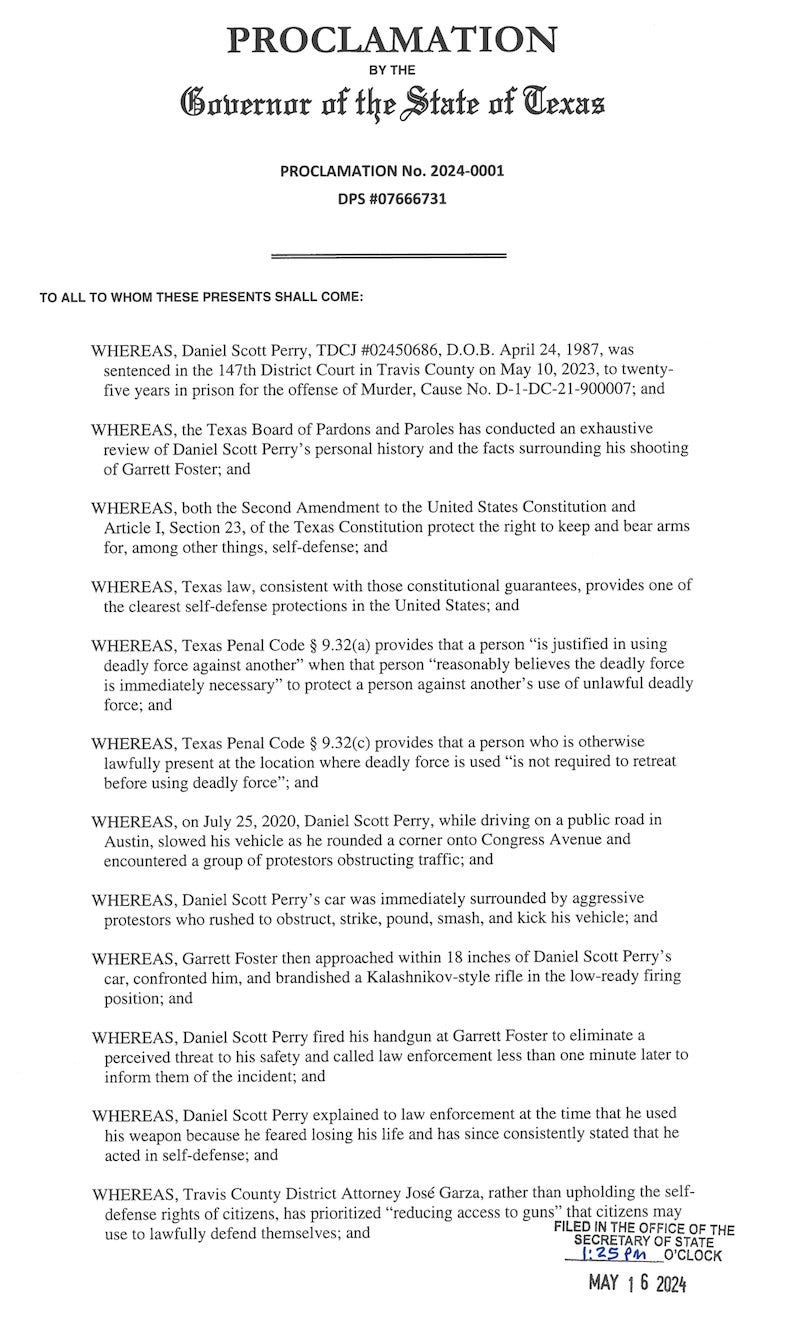You see his craven inhumanity manifest across Texas. Look to the border, where razor wire spins in the middle of the Rio Grande, killing people, and desperate parents try to climb up muddy banks toward armed men who have been wrongly convinced they are protecting the state. He spends billions on wire and walls and soldiers and guns but does nothing about a million children without healthcare. Not once has he ever mentioned the names of the soldiers who have died serving his political stunt known as Operation Lone Star. When the federal government offered a free summer lunch program for students from low-income families, he said no, without reason or rationale. A roomful of schoolchildren got torn to pieces by a madman’s gun and people were massacred at a department store in El Paso and he addressed it by eliminating all firearms regulations after promising to make meaningful changes.
With over $30 billion in surplus taxes, he refused to give public school teachers a pay raise because the legislature would not approve his plan to steer state tax money to private Christian schools, which would leave urban campuses increasingly impoverished and re-segregated. Nothing bothers him about the fact that Texas is one of the lowest per pupil spenders in the country on public schools, lagging $4000 behind the national average. He issues executive orders for state institutions to eliminate Diversity, Equity, and Inclusion programs, designed to increase minority participation in education and jobs, and he orders DPS storm troopers onto the University of Texas campus to assault peaceful student protestors denouncing the genocide in Gaza. Overwhelming law enforcement was dispatched in direct contradiction to his previous threats to end state funding for universities that did not ensure free speech by permitting right wing agitators to appear on their campuses. It’s the same police force that stood with its guns lowered during the Uvalde rampage but ran roughshod over people college students peacefully assembling.
The U.S. Constitution is capriciously violated daily by him as he ignores Supreme Court rulings he does not like and creates new laws that abridge the powers of the federal government to protect the border by allowing Texas police to arrest undocumented immigrants. He pushed and passed unreasonable voter ID laws that make exercising the franchise more difficult for Black and Latino communities and voters with disabilities. His regulations made mail-in ballots almost impossible and banned drive-thru and 24-hour voting and he makes all these decisions while posturing as a Christian and posting scripture on his social media feeds, oblivious of his own hypocrisies. The man took public joy in posting a video of an alligator in the Rio Grande near Eagle Pass, increasing the risk of death for immigrants on the river, and has no sympathy for the lives of women being ruined by his abortion laws, which force dangerous births and constrain doctors trying to save lives.
By even the most rudimentary analysis, Texas Governor Greg Abbott, is evil.
The self-proclaimed “law and order” governor’s ignominy reached celestial heights this past week, though, when he pardoned a convicted murderer who had killed a protestor that apparently possessed the wrong kind of politics to earn Abbott’s sympathy. Maybe it’s okay to kill in Texas if you murder the right type of person. Not sure what other message the governor is sending after setting free Daniel Perry, a former U.S. Army sergeant who had shot and killed a man at a Black Lives Matter demonstration in downtown Austin. According to witnesses, Perry turned his car into a crowd of people protesting racial injustice after the George Floyd death at the hands of Minneapolis police. The vehicle was approached by 28-year-old Garrett Foster, a U.S. Air Force veteran who was legally carrying an AK-47. No one ever claimed to see any indication he was going to fire his weapon.
But Perry did. He described Foster’s gun as being carried at “low ready,” implying he was about to bring it up to firing level. If so, he never got the chance because Perry repeatedly fired bullets into Foster and ended his life. The idea Foster was about to shoot was called untrue by witnesses in Perry’s trial and was rendered mostly preposterous by the fact that he was pushing his partner, a quadruple amputee, in her wheelchair. The fact that she was Black might have even triggered Perry, who had posted several racist messages on social media prior to the shooting. In the wake of the Floyd death by police, Perry said in one message, “I think I might go to Dallas and shoot looters.” He also warned, “No protestors go near my car,” which was the mistake made by Foster when he approached Perry’s vehicle in Austin. Evidence admitted in court showed Perry also wrote, “I wonder if they will let me cut the ears off of people who’s decided to commit suicide by me.”
None of that, however, represented a problem for the Texas governor. As soon as Perry was sentenced to 25 years in prison after a jury trial, Abbott announced he planned to issue him a pardon. When the racist memes from Perry were later made public, he backed off slightly and said the Board of Pardons and Paroles would be given all the information to make a decision. The outcome, of course, was a foregone conclusion since all seven members of that board are appointees and political confederates of the governor. Abbott ought to have stayed out of the case, especially when he ignored racist memes from Perry like the one that showed a mother forcing her child’s head underwater in a bathtub. Perry posted in all caps next to the photo, “WHEN YOUR DAUGHTERS FIRST CRUSH IS A LITTLE NEGRO BOY.” Much of the evidentiary filing by prosecutors suggests the case against Perry might have reasonably been argued as a more serious hate crime.
Predictably, Abbott’s pardon declaration emphasized the Second Amendment and the state’s “stand your ground” law, which empowers people to use deadly force and not retreat if they feel their lives are being threatened. No mention is made, of course, that there was no evidence of threatening behavior from Foster. Abbott also pointed his angry little finger at Travis County District Attorney Jose Garza for not “upholding the self-defense rights of citizens” and “reducing access to guns.” The governor is implying he may seek to remove Garza under the HB 17 law that allows the state to fire elected district attorneys if they refuse to prosecute certain types of crimes.
Daniel Perry, meanwhile, walks free even though court testimony from psychologists described him as suffering from PTSD and types of autism and offered prognoses indicating he may return to violence. Foster’s 31-year-old common-law wife who witnessed his killing and had been with him since high school, lives alone now in a home they had customized for her handicaps. The quadruple amputee has lost her husband and caregiver to the whims of an angry, trigger happy, racist.
And Greg Abbott waits for his next chance to dance again with the devil.






I’m a fifth generation Texan and I had to break up with my beloved home state. On the car ride up to Olympia, I wept. I played every break up song I could find. It felt like giving up. I did 20 years in Texas politics- my patch was getting pro-choice women elected and training staff. I couldn’t do it anymore. It hurt too much. Once my step kids were grown, my Dad and Grandma passed away- there was nothing left to stay for. I selfishly wanted to live the remainder of my life in a place not quite so hot, mean, and stupid. I have survivors guilt, but it doesn’t hold a candle to the violence and indignity that millions of Texans suffer at the hands of white people in charge… same as it ever was. I hope the kids burn it down, and along the way learn to govern. The average dictatorship lasts for about 15 years. Surely, there’s an overdue reckoning around the corner? - but Pete and I couldn’t wait any longer. I pray for peace, but secretly hope for revenge. I’m not proud of that, but then again we’re dealing with folks who kick children in rivers and watch women die on concertina wire. So fuck them. I love the people, the landscape, the diversity, and the ridiculousness of my home state. I love the art and music. I love HEB… the only functioning statewide energency response we have. Texas has always been tough, but life is short. Get out while you can. Bring your old people and kids with you. America is so much better than the Lonestar State.
The descriptor "evil" being applied roused my interest. I tended to attach (a now discredited) genetic predisposition to the word, i.e., "the evil XYY." So I examined the etymology and found (condensed version): In Old English and other older Germanic languages other than Scandinavian, "this word is the most comprehensive adjectival expression of disapproval, dislike or disparagement" [OED]. Evil was the word the Anglo-Saxons used where we would use bad, cruel, unskillful, defective (adj.). In Middle English, bad took the wider range of senses and evil began to focus on moral badness. Both words have good as their opposite.
Also as a noun in Old English, "what is bad; sin, wickedness; anything that causes injury, morally or physically." Especially of a malady or disease from c. 1200. The meaning "extreme moral wickedness, conduct contrary to standards of morals or righteousness," was one of the senses of the Old English noun, but it did not become established as the main sense of the modern word until 18c. (And if I may add, perfected by the governor and his cronies.)
••••Thus informed, I find it most appropriate if not exigent in usage as applied herein.